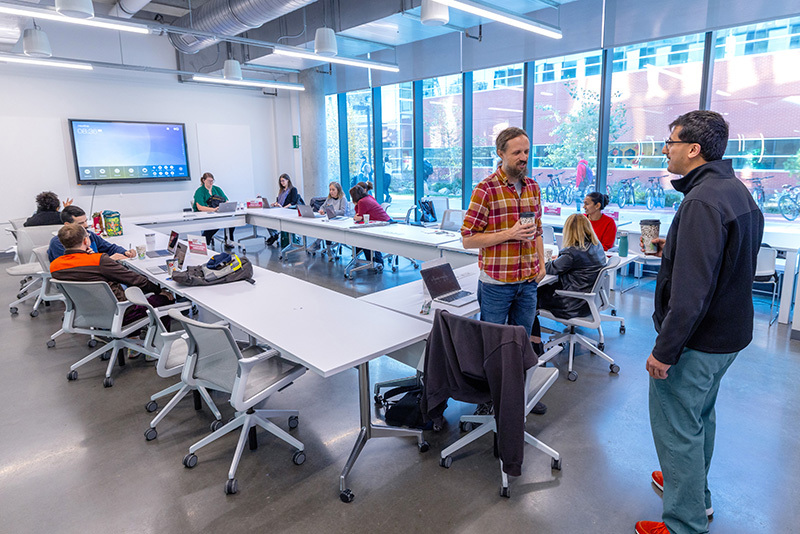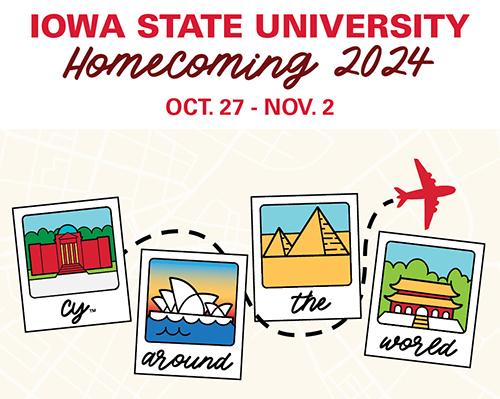
Graduate students mingle while talking academics and career goals during the Grad Mixer Wednesdays event at the Student Innovation Center. Each Wednesday this fall features a daylong lineup of useful programming for grad students. Photo by Christopher Gannon.
Graduate College associate dean for professional development Elena Cotos wanted a way to bring graduate students together and provide consistent programming that balances professional development with social connectivity. Working with leaders at the Student Innovation Center, she and her team developed Grad Mixer Wednesdays, weekly daylong events for grad students to socialize, network and ask questions. The mixers' focus is to improve their communication, research, teaching, career and leadership abilities.
"In Pearson Hall, we don't have a space for graduate students to come and feel like it is their home," Cotos said. "They can get so busy with their coursework, teaching, research or other assistantship responsibilities that they miss that sense of belonging and community. Especially for newer graduate students, the mixers are an opportunity to learn about different forms of support, services and professional development opportunities available to them at Iowa State."
Graduate students are invited to room 1118 to take advantage of mostly hourlong activities. Each Wednesday contains seven activities; no registration is needed and students come and go as their schedules allow. The weekly schedule is:
- Coffee buzz (8-9:30 a.m.): Free coffee and networking opportunities with staff from student-serving units.
- Academic drop-ins (9:30-11 a.m.): Individual work with peer mentors specializing in areas such as written and oral communication, thesis/dissertation writing, English writing and speaking, competitive awards or career coaching.
- Innovation at Iowa State (11 a.m.-noon): Faculty and graduate students showcase their work.
- Lunch and mingle (noon-1 p.m.): A friendly place to eat lunch and build community.
- Career watch party (1-2 p.m.): Information for career-minded students on a range of employment topics.
- Peer-mentored groups (2-3 p.m.): A peer-facilitated environment where students receive feedback and accomplish their accountability goals.
- Workshops and seminars (3-4:30 p.m.): Topic-driven talks to enhance academic and professional skills.
The activities were determined, in part, by requests the graduate professional development staff receives on skill development and nationally recognized career expectations of graduate students.
Student and faculty benefit
Cotos said faculty are invited to share their research with graduate students during the Innovation at Iowa State hour. But her biggest request is that faculty encourage their graduate students to attend the mixers. That exposure reaps benefits to faculty, too.
The mixers highlight assistance available to grad students that develop skills that will make them competitive in their future careers while easing the demand on faculty.
"The Graduate College has the Center for Communication Excellence that provides a lot of support for students who need to improve their research writing," she said. "It also can help with their presentation or interpersonal skills. We know our faculty are busy, and that graduate students need feedback about what makes a research paper good or a presentation impactful."
Cotos said professional development staff lend help in key areas that are beneficial to participants as students at ISU and in the workforce.
"We also prepare students for academic and non-academic careers, helping them navigate the job seeking process, prepare application documents, practice interviewing and present personal branding on social media," she said.
The Graduate College has about 15 graduate peer mentors in communication consulting and career coaching roles who assist other students each semester and also facilitate mixer events. They go through significant training -- including a practicum -- to become certified, Cotos said. The peer-support model began in 2015 and has consistently expanded.
Looking ahead
Cotos hopes to continue the mixers past the fall semester with graduate students taking more ownership.
"I want to give them more leadership opportunities to organize events for the mixers," she said. "I want them to select the topics and types of activities that are most important to them. Taking that leadership may not be something they have a lot of experience with, and many of them are looking for those opportunities."
In addition to developing leadership skills, giving grad students more say lets them set a feasible schedule and spread the word with their peers, Cotos said.

